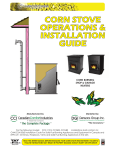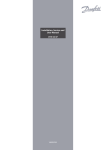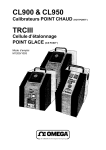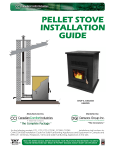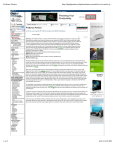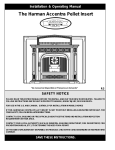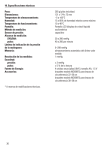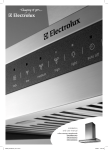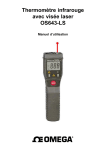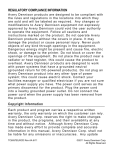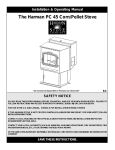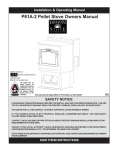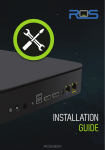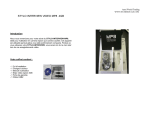Download ANTARTIDA BURDEOS
Transcript
ANTARTIDA BURDEOS HIJOS DE BARTOLOMÉ FAJARDO, S.L. Apartado de Correos Nº17, Avda. De la Roda Nº11, 02100 Tarazona de la Mancha (Albacete) SPAIN Tlf. +34 967 480 086, Fax +34 967 497 110 www.fajardo.net , e-mail. [email protected] READ AND SAVE THESE INSTRUCTIONS FOR FUTURE REFERENCE (ULC S627) / LIRE ET CONSERVER CE MANUEL POUR RÉFERENCE (ULC S627) 1 CAUTION : HOT WHILE IN OPERATION. DO NOT TOUCH. KEEP CHILDREN AND CLOTHING AWAY. CONTACT MAY CAUSE SKIN BURNS. SEE NAMEPLATE AND INSTRUCTIONS. KEEP FURNISHINGS AND OTHER COMBUSTIBLE MATERIALS A CONSIDERABLE DISTANCE AWAY FROM THE APPLIANCE. ATTENTION: TRÈS CHAUD AU MOMENT DU FONCTIONNEMENT. NE PAS TOUCHER, RISQUE DE BRULURES. GARDEZ LES ENFANTS, LES VETEMENTS, LES MEUBLES, ET TOUS LES MATÉRIAUX COMBUSTIBLES LOIN DE L’ESPACE DÉSIGNÉ DE L’APPAREIL. LIRE ATTENTIVEMENT LES ETIQUETTES ET LES INSTRUCTIONS DU MANUEL. - Do not OVERFIRE, if heater or - NE PAS SURCHAUFFER, si une partie chimney connectors glows, you de l’appareil ou du raccordement de are overfiring. cheminée commence à rougir, vous ètes en situation de surchauffe. 2 DO NOT REMOVE THIS LABEL / NE PAS ENLEVER CETTE ETIQUETTE CONTACT LOCAL BUILDING OR FIRE OFFICIALS ABOUT INSTALLATION RESTRICTIONS IN YOUR AREA. / RENSEIGNEZ-VOUS AUPRES DES AUTORITÉS LOCALES DE LA CONSTRUCTION ET DE LA PREVENTION DES INCENDIE AU SUJET DES RESTRICTIONS ET INSPECTIONS D’INSTALLATION DANS VOTRE RÉGION. LISTED SOLID FUEL BURNING APPLIANCE SUITABLE FOR USE IN RESIDENTIAL ISNTALLATIONS./APPAREIL DE CHAUFFAGE A COMBUSTIBLES SOLIDES HOMOLOGUÉ POR INSTALLATIONS RESIDENTIELLES MODEL / MODÈLE : ANTARTIDA Manufactured by/ Fabriqué par: HIJOS DE BARTOLOMÉ FAJARDO, S.L. Avda. La Roda, 11 – 02100 Tarazona de la Mancha (AB) - SPAIN 4003555 CONTROL Nº SERIAL NUMBER NUM. DE SERIE TESTED TO / TESTÉ AUX NORMES: UL1482-10, ULC-S627-00 Certified to CAN/CSA Standard ULC S627 - Conforms to ANSI/UL Std. 1482.” Room heater, Solid fuel type. No for use in mobile homes and Sleeping Room. Poêle à combustibles solides. Ne pas installé dans une maison mobile ou chambre à coucher. PREVENT HOUSE FIRES : For use with solid wood fuel only. Install and use only in accordence with the manufacturer’s installation and operating instructions. Contact your local building or fire officials about restrictions and installation inspection in your area. Do not connect this product to a chimney flue serving another appliance. Do not run a chimney connector trough a combustible wall ceiling. Clearances may be reduced by methods specified in NFPA 211, listed wall shields, pipe shields, or other means approved by local building or fire officials. Operated with feed door closed , open only to feed fire Do not use a grate to elevate fire, build fire directly on heart. Do not operate with the ash door open. Do not OVERFIRE, if heater or chimney connectors glows, you are overfiring. Inspect and clean chimney frequently, under certain conditions of use, creosote build up may occur rapidly. PRÉVENTION DES INCENDIES : Utilisez uniquement du bois Installez et utilisez conformément aux instructions du fabricant. Renseignez-vous auprès des autorités compétentes de la construction et de la prévention des incendies au sujet de restrictions et inspections d’installation dans votre région. Vérifiez les instructions du fabricant et les codes du bâtiment. NE PAS passer les tuyaux à travers une surface combustible. Ne pas connecter dans un système de cheminée partagé avec d’autres appareils. Les dégagements minimaux des matériaux combustibles peuvent être réduits selons les méthodes spécifiées dans NFPA 211, avec des protections murales homologuées, des protections de cheminée homologuées, ou d’autres moyens approuvés par les autorités de la construction et la prévention d’incendies. Ne pas faire fonctionner avec les portes ouvertes, ouvrir uniquement pour charger. Ne pas élever le feu avec la grille en fonte, faire le feu sur le foyer. Ne pas faire fonctionner avec la porte du tiroir à cendres ouverte. NE PAS SURCHAUFFER, si une partie de l’appareil ou du raccordement de cheminée commence à rougir, vous ètes en situation de surchauffe. Inspectez et nettoyez la cheminée avec fréquence. Vérifiez la formation de créosote. FREESTANDING / INSTALLATION STANDARD RESIDENTIAL FREESTANDING / INSTALLATIONS REQUISE : 6” diameter, minimum 24 MSG black or 26 MSG blue steel connector, with listed (type UL103 HT) factory built chimney, suitable for use with solid fuels or masonry chimney./ Pour les installations résidentielles: Utilisez un connecteur de cheminée de 6” de diamètre, en acier noir de minimum 24 MSG ou en acier bleu de minimum 26 MSG vers une cheminée préfabriquée homologuée (type UL103 HT ou ULC S629) ou vers une cheminée en maçonnerie. CLEARANCE REQUIREMENTS / DÉGAGEMENTS MINIMAUX DES MATÉRIAUX COMBUSTIBLES. STANDAR RESIDENTIAL INSTALLATION / INSTALLATION RÉSIDENTIELLE STANDARD A Side wall to appliance / Du mur de coté au poêle 12" (304,80 mm) B Back wall to appliance / du mur à l’arrière du poêle 15" (381 mm) C Back wall to stove pipe / Du mur au tuyau d’évacuation 16,75" (425,45 mm) D Side wall to stove pipe / du mur au tuyau d’évacuation 20,75" (527,05 mm) E F Corner wall to appliance / Du mur au coin du poêle Corner wall to stove pipe / du mur au coin du tuyau d'évacuation 14" (356 mm) 21" (533 mm) CAUTION : HOT WHILE IN OPERATION. DO NOT TOUCH. KEEP CHILDREN AND CLOTHING AWAY. CONTACT MAY CAUSE SKIN BURNS. SEE NAMEPLATE AND INSTRUCTIONS. KEEP FURNISHINGS AND OTHER COMBUSTIBLE MATERIALS A CONSIDERABLE DISTANCE AWAY FROM THE APPLIANCE. ATTENTION: TRÈS CHAUD AU MOMENT DU FONCTIONNEMENT. NE PAS TOUCHER, RISQUE DE BRULURES. GARDEZ LES ENFANTS, LES VETEMENTS, LES MEUBLES, ET TOUS LES MATÉRIAUX COMBUSTIBLES LOIN DE L’ESPACE DÉSIGNÉ DE L’APPAREIL. LIRE ATTENTIVEMENT LES ETIQUETTES ET LES INSTRUCTIONS DU MANUEL. U.S. ENVIROMENTAL PROTECTION AGENCY CERTIFIED TO COMPLY WITH NORMES EPA PHASE 2 / CERTIFIÉ CONFORME AUX NORMES EPA FASE 2 3 Poêle à bois Antartida (avec foyer mobile) Ce produit vous a été fourni avec le foyer dans la position A (sur le centre du bûcher) si vous souhaitez le changer de position (B ou C), il suffit de dévisser les vis (pièces X) y de placer le foyer sur le côté désiré avec précaution pour éviter de faire des rayures sur la surface du bûcher, dernièrement, insèrez à nouveau les vis (x) dans les trous et vissez-les. Wood burning Stove Antartida (with sliding home) This product has be provided with home in position A (in center of the wood storage compartment) if you wish to change it of position (B or C), clear the winches (pieces X) and place the home in the side that you wish with much precaution to avoid scratching in the surface of the wood storage compartment, finally insert the winches (x) in the holes and screw it. Posición A Posición B Posición C 4 - TABLE OF CONTENTS – 1. INTRODUCTION 2. IMPORTANT WARNING 3. SAFETY 4. INSTALLATION 5. CLEARANCE REQUIREMENTS 5.1. SAFETY DISTANCES 6. CONDUCT 6.1. Connection pipe to the chimney 6.2. Chimney 6.2.1. Prefabricated chimney 6.3. Height of the chimney 7. LIGHTING 8.1. Fuel 8.2. Lighting 8.2.1. Lighting for the first time 8.2.2. Lighting in normal conditions 8.2.3. The rate of the combustion 8. CLEANING 8.1. Combustion chamber 8.2. Glass door 8.2.1. Cleaning 8.2.2. Replacement 8.3. Cleaning of ashes 8.4. Formation of creasote and/or soot 9. Guarantee 5 6 1. INTRODUCTION You have just acquired a product manufactured by FAJARDO. The Antartida model is a topclass, non-catalytic product, manufactured with high-quality materials, with double combustion, non-polluting, with emissions of solid particles of 5.47g per hour, which has been awarded with the EPA certification. It has been tested by the INTERTEK Testing Services NA, Inc., in accordance with the UL1482 and ULC S627 standards. Please read the whole installation manual carefully, in order to ensure a correct operation and maintenance of your stove. Read this manual carefully before installing. Keep these instructions for future reference. 2. IMPORTANT WARNING To reduce the risk of fire and to obtain a correct functioning of this product, follow the installation instructions. Read these instructions carefully and remember that the installation of this product has to be carried out by a qualified person. HIJOS DE BARTOLOMÉ FAJARDO, S.L., with the registered address in Avda. La Roda, number 11, Tarazona de la Mancha, C. P. 02100, Albacete, España, will not be held responsible for the damage caused by an incorrect or negligent maintenance of the product. It is forbidden to modify the stove without previous authorisation. The guarantee will be valid for 24 months as from the date of purchase, and to ensure the validity, it must be accompanied by the purchasing invoice, or the receipt. It is necessary to consult the competent authority (fire brigade, police, etc.) before carrying out the installation, in order to determine whether special permission is required, or if there are restrictions and inspections regarding the installation of this kind of heating appliances. 3. SAFETY There are possible risks that need to be taken into account when you put your stove into operation. These risks can be reduced if the instructions and recommendations that are provided in this manual are followed, although it is especially important to use your common sense. 7 - READ THE WHOLE OF THIS MANUAL CAREFULLY BEFORE INSTALLING AND USING THIS PRODUCT AND FOLLOW ALL THE RECOMMENDATIONS. OTHERWISE, THIS COULD RESULT IN CAUSING DAMAGE TO YOUR PROPERTY, CAUSING HARM TO PEOPLE, OR EVEN DEATH. - DO NOT INSTALL THE PRODUCT IN A MOBILE HOME OR IN A BEDROOM. - ATTENTION: WHEN LIGHTING THE STOVE, NEVER USE CHEMICAL FUEL AND/OR LIQUID, SUCH AS ALCOHOL, PETROL, NAPHTHA, KEROSENE, ETC. ALL THESE KINDS OF PRODUCTS MUST BE KEPT AWAY FROM THE STOVE WHEN IT IS IN USE. - IT IS TOTALLY FORBIDDEN TO BURN WASTE, DOMESTIC RUBBISH, PAINTED PAPER, PLASTICS, FIBREBOARD, SYNTHETIC MATERIAL, MINERAL FUEL, COAL, ETC., AS THESE COULD DAMAGE THE STOVE, OBSTRUCT THE CHIMNEY WITH THE RISK OF CAUSING FIRE AND SEROIUSLY HARM THE ENVIRONMENT. - BEWARE OF BURNS: KEEP CHILDREN AWAY FROM THE STOVE WHEN IT IS IN OPERATION, AS WELL AS FABRICS, FURNITURE AND RUGS, ETC. - ALWAYS USE THE RECOMMENDED FUEL, GOOD QUALITY NATURAL FIREWOOD THAT HAS BEEN DRIED IN THE OPEN AIR. AVOID BURNING WOOD THAT HAS NOT BEEN DRIED. - IT IS FORBIDDEN TO USE THE FUEL CONTAINER. DO NOT LEAVE FIREWOOD NEAR THE STOVE WHEN IT IS IN USE. - THE GLASS AND THE IRON PIECES MAY REACH HIGH TEMPERATURES. BE CAREFUL WHEN OPENING THE DOOR AND USE THE GLOVE TO AVOID POSSIBLE BURNS. - IT IS RECOMMENDED TO CARRY OUT PERIODICAL INSPECTIONS OF THE CHIMNEY AND TO CLEAN IT WHEN NECESSARY. - IN THE EVENT OF THE STOVE CATCHING FIRE: CLOSE THE AIR REGULATOR AND CALL THE FIRE BRIGADE. - IF YOU CAN SMELL BURNING OR THE AREA AROUND THE STOVE IS OVERHEATED, ASK FOR A TECHNICAL REVISION. - MAKE SURE NO COMPONENT OF THE ELECTRICITY NETWORK IN YOUR HOIME IS AFFECTED BY THE HEAT FROM THE STOVE OR THE CHIMNEY. 8 - CLOSE THE DOOR AFTER LOADING THE STOVE. THIS STOVE HAS NOT BEEN DESIGNED TO BE USED WITH THE DOOR OPEN. - DO NOT RAISE THE FIRE TO THE HEIGHT OF THE GRATE. THE FIRE MUST BE MADE IN THE HEARTH. - DO NOT OVERHEAT. IF ANY PARTS OF THE STOVE OR THE CHIMNEY TURN RED, THIS MEANS THERE IS OVERHEATING. INSTALLATION In order to ensure the correct operation of the stove, the installation must be carried out by following the instructions given in this manual. The stove must be placed in a well-ventilated area, which should have at least one window. This will help to distribute the hot air between the different areas in the home. The connection pipes should have a diameter of 6 inches and both these and the stove must be kept at a distance from inflammable material. Do not install the stove on an inflammable floor. If this is not possible, a metal or ceramic plate (fireproof) must be placed under the stove. This must cover the surface of the heater and protrude 8 inches (203mm) on the sides and the opening of the ash box and 16 inches (406mm) on the front. Under the connection of the chimney, a projection of 2 inches (50.8mm) on either side will be necessary. 9 Never install the stove near walls that burn easily (plasterboard, wallpaper, etc.), and pay special attention to curtains and/or rugs. This concept is applied not only to visible surfaces but to also what is behind inflammable material. If this is the case, it will be necessary to respect safety distances. If you have any doubts regarding inflammable material, the competent authorities are the best people to give you advice. 5. CLEARANCE REQUIREMENTS 5.1. Safety distances: It is important to place the stove in an area that allows sufficient circulation of air and we should make sure it is not an obstacle for people, especially children. It is of extreme importance to respect the safety distances indicated by the manufacturer and those that are stated by law in your area. Under no circumstances should the safety distances of the installation be less than those indicated in this manual. CLEARANCE REQUIREMENTS / DÉGAGEMENTS MINIMAUX DES MATÉRIAUX COMBUSTIBLES. STANDAR RESIDENTIAL INSTALLATION / INSTALLATION RÉSIDENTIELLE STANDARD A Back wall to appliance/ Du mur a l'arrière du poêle B Back wall to stove pipe/ du mur au tuyau d'évacuation C Side wall to appliance / Du mur de coté au poêle 12" (304,80 mm) D Side wall to stove pipe / du mur au coté du poêle 20,75" (527,05 mm) E Corner wall to appliance / Du mur au coin du poêle 14" (356 mm) F Corner wall to stove pipe / du mur au coin du tuyau d'évacuation 21" (533 mm) 10 15,00" (381 mm) 16,75" (425,45 mm) 5.2. Reduced safety distances: It is possible for you to reduce these distances by installing protective screens between the walls or in the ceiling and the stove. These protective screens must be installed permanently and may be made of a steel sheet, a rigid inflammable panel, or a brick wall. A distance of 1 inch (25cm) between the bottom of the protective screen and the floor, and a distance of 3 inches (76cm) between the top of the screen and the ceiling are the distances that are required to ensure a proper circulation of air behind the screen. The protective screen must exceed the top of the stove by 20 inches (500mm) and it must exceed the sides by at least 18 inches (450mm). 6. CONDUCT Some rules that need to be remembered for the correct functioning of the stove: - Use resistant and inflammable materials. - Do not use fibre-glass concrete. - The diameter must be the same width - 6inches - as the outlet on the stove and in regard to the minimum thickness, for a black steel pipe this must be of 24 calibre and if a bronze steel pipe is used, it must be of 26 calibre. Each stove must have its own conduct, that is, DO NOT CONNECT SEVERAL STOVES TO THE SAME CONDUCT. This must be in perfect condition and kept clean to ensure it draws perfectly, thus maintaining the fire alive. 6.1. Connection pipe to the chimney: The connection pipes must have a diameter of 6”. Do not use aluminium pipes or galvanised steel with this kind of appliance; they are not prepared to resist such high temperatures and under these conditions they could issue toxic gases. Do not connect or use together with any air distribution conduct, unless it has been specifically approved for this installation. 11 The pipes must be positioned on the outlet opening with the male part of each pipe facing towards the stove. This will stop the creosote/soot caused by condensation from falling down the pipe and onto the stove (A) facing towards the stove and (B) facing upwards. All the pipes, including the one that is in the smoke outlet, will be attached with two metal screws. If possible, the stove can be installed in the fireplace under the chimney. Take the necessary precautions when passing through forged areas, use insulated double pipes in the cases there is a risk of fire. The pipes will not pass through attics, roofs, cupboards or any similar hidden area. When it is necessary to pass through a wall, or a part of a building, the installation will be carried out in accordance with the NFPA 211 or CAN/CSA-B365 regulations of the Installation Code for Electrical Appliances for solid fuel burning. 6.2. Chimney: WARNING: THIS APPLIANCE IS NOT SUITABLE FOR INSTALLATION IN A CHIMNEY SYSTEM THAT IS SHARED WITH OTHER APPLIANCES. This product must be connected to a chimney that complies with the requirements for this type of HT chimneys in the Regulations on UL 103 chimneys or a code-approved brick chimney with a flue liner. 12 6.2.1. Prefabricated chimney. Follow the instructions exactly and purchase the materials in a homologated establishment. A CHAPEAU DE CHEMINÉE / CHIMNEY CAP COLLIER COUPE VENT / STORM COLLAR B PIÈCE DE TOIT RÉGLABLE / ADJUTABLE ROOF C SOLIN / FLASHING D PLAQUE D’ISOLATION / INSULLATION SHIELD E BOITIER DE SOUTIEN AVEC SECTION DE DÉPART INCORPORÉ / SUPPORT BOX WITH BUILT-IN F TUYAU DE RACCORDEMENT / STOVE PIPE G TUYAU DE RACCORDEMENT / STOVE PIPE One story house installation with attic Chimney is supported by celling. 13 6.3. Height of the chimney. The chimney should be at least 36” (90cm) taller than the place where it meets the roof and at least 24” (60cm) taller than the highest point of the whole structure within a radius of 120” (305cm). The minimum total height of the conduct from the top of the stove to the tip of the chimney outside must be of at least 144 inches (366cm), in order to obtain a correct draw. A 2" (minimum) B 10" (minimum) C 3" (minimum) DRAW: a correct draw will enable you to obtain maximum performance and enjoyment from your appliance. The tendency of hot air rising creates the draw. When the stove is lit, the hot air will rise up the smoke conduct and will go outside. The conduct heats and maintains the draw. Until the stove and the chimney are both hot, the draw will not function perfectly. The conduct must be clean and in perfect condition in order to obtain a good draw of the stove and to keep the flame alive. The position, size and height of the smoke conduct affect the draw. It is necessary to take the following points into consideration: - The diameter recommended by the manufacturer maintains a good draw. - The stove and its evacuation pipe will be kept hot if they are placed inside the home, thus allowing a better draw. - The stretches of draw that have to be placed outside the home must be adequately insulated, in order to keep the smoke hot, thus ensuring a correct draw. - The height of the chimney affects the draw. 14 - In the event the smoke conduct has to be diverted, there must not be more than two inclinations and the angles must not exceed 45º - Never install a damper. This product is a stove with controlled combustion. We can regulate the draw by means of the entries of primary air. When installations are made in places with strong winds and/or when the pipe extends more than 1 metre above the roof, it is necessary to place tensors to support the pipe. If work, modifications or repairs have been carried out near the pipe or the stove after installation, check that none of the details specified in this User Manual has been altered. 7. LIGHTING Before starting your appliance, check that the refractory stones in vermiculite are correctly positioned. 7.1. FUEL: Use firewood The most recommended wood corresponds to that which does not have much resin and which has been drying in the open air for between one and two years, making sure there is no more than 20% degree of humidity. Take into account that wood with an excessive degree of humidity does not heat, it burns badly, it coats the glass with creosote and vapour, as well as favouring the deposit of soot on the appliance, glass and smoke conducts (chimney). Never burn salty wood, wood found on the beach, treated wood or wood that has been found in a salt-water lake, since this type of fuel could cause corrosion in the fuel chamber. Never use chemical fuel or liquids to light the stove, such as alcohol, petrol, naphtha, kerosene, etc. These kinds of products must be kept away from the stove when it is in use. It is totally forbidden to burn painted paper, plastics, cardboard, mineral fuel, coal, etc. This could seriously damage your stove, pollute the air and even cause it to catch fire. NEVER BURN MANUFACTURED FIREWOOD THAT CONTAINS CHEMICAL ADDITIVES. Any damage caused by chemical products or salt are excluded from the guarantee. 15 7.2. LIGHTING: 7.2.1. LIGHTING FOR THE FIRST TIME: 1. Place a piece of crushed paper on the combustion chamber and cover with several wood chips. 2. Light the fire and close the door leaving the draw open. 3. Add a load of wood of not more than 2 kilos (4.4 pounds), leaving some space for air to circulate. 16 4. Close the door and leave the air vent completely open until the wood has caught fire. The fire must burn slowly for three or four hours, with a moderate load of firewood, to allow the paint pigments to burn. At the beginning, the stove may produce a smell and some smoke. This is due to certain components of the exothermic paint burning; for this reason, it is recommended to ventilate the room well, until the smell has completely disappeared. At the beginning, it is convenient to not excessively heat the stove. 7.2.2. LIGHTING IN NORMAL CONDITIONS: Make the fire on the grate with the paper and wood chips or special fire-lighting cubes. Avoid lighting the fire near the glass. Once the fire has been lit and the air vent is working well, add between a maximum of 2 (4.4 pounds) and 4kg (8.8 pounds) of dry firewood for each load. NEVER OVERLOAD THE STOVE. DO NOT ADD MORE THAN 5kg, an overload could cause the stove to overheat and damage the appliance. It is recommended to light the fire with a reduced quantity of firewood so the air vent is able to start working progressively without accumulating too smoke inside the stove chamber. It is recommended that during the lighting phase the door is kept ajar, as this makes lighting easier and stops the glass from misting up during the first minutes. Once the stove has been lit and it is hot, the door must be closed. This stove is not designed to work with the door open, otherwise this could damage the welding. 17 7.2.3. THE RATE OF THE COMBUSTION: The stove must function with the door closed. When the stove starts burning normally, the desired temperature will be obtained by controlling the entry of air by means of the regulator located in the glass door. If it is open, the temperature will increase and consumption and if it is closed, both the temperature and consumption decrease. Do not light the fire near the glass door or leave the firewood close by, in order to stop it from becoming dirty. Do not open the door too quickly or violently to avoid the drawing the flame and smoke outside and when closing the door, make sure this is done softly, in order to avoid bangs, which could knock it out of position or break the glass. It is normal that after the first few times the stove is used, the brass pieces will turn coppercoloured and they become darker. Instructions: for a slow combustion, load the stove with 2kg of firewood and close the air regulator. 8. CLEANING 8.1. COMBUSTION CHAMBER. Cleaning must be carried out regularly, and only when the appliance is cold. It is necessary to clean the whole of the combustion chamber and its corresponding removable parts, grate, deflector, etc. 8.2. GLASS DOOR: To avoid the glass getting dirty quickly, do not burn humid firewood. Keep the air control in the intermediate or maximum position. 8.2.1. Cleaning: it is a good idea to clean periodically so the remains of soot do not turn black. Special window cleaners for stoves are quite effective products. 18 Do not ever try to clean the glass whilst the stove is in use, or use abrasive products that may scratch it. 8.2.2. Replacement: The glass can resist a temperature of 750ºC. In the event of it accidently breaking, it must be replaced by glass that has the same characteristics. To avoid accidents, it is necessary to wear gloves when handling broken glass. Contact our distributor who will supply you with ceramic, 3-cm thick glass of the same quality, with the appropriate joints for your stove. A worn joint makes the glass turn black quicker. Never replace the glass for current glass; it has to resist 750ºC. In order to avoid breakages, try to close the door softly, avoiding any bangs. 8.3. CLEANING OF ASHES. The stove is provided with an ash drawer that is situated under the glass door. Do not let the drawer fill up with ashes until these reach the grate as this could overheat the grate, thus causing damage, as well as blocking the passage of the combustion air. The ashes should be removed and placed in a steel container with an airtight lid and it will be taken outside immediately. It will not be possible to sell other products in this same container. 8.4. FORMATION OF CREASOTE and/or SOOT. When wood burns slowly, it produces tar and other chemical vapours and when these combine with humidity they form creosote, expelling tar. The vapours of the are condensed in the chimney pipe that is relatively cold due to a red-hot, slow fire. As a result, the residues of creosote accumulate inside the pipe. When this is lit, the creosote can cause an intense, very hot fire. The chimney should be inspected periodically during the season when heating is necessary in order to determine whether there is an accumulation of creosote. If there is a significant layer of creosote, (3mm or more) this must be removed, in order to reduce the risk of the chimney catching fire. 19 10. GUARANTEE: This stove is a top-quality product, manufactured with high-quality materials. If despite everything, any fault is produced, please consult our distributor first. If this person is unable to resolve the problem, he/she will contact us. Our company will replace any faulty part, free of charge. Labour, shipping for collecting and sending will not be invoiced, as long as it can be proved that the problem is due to a faulty product. Otherwise, the customer will be responsible for all the expenses that are caused by the incident (labour, two-way shipping, plus spare parts). Our guarantee is valid for 24 months as from the date of purchase, and to ensure the validity, it must be accompanied by the purchasing invoice, or the receipt. Inside the packaging you will find a quality control card. Please send it to the distributor, together with the invoice. The guarantee of our products excludes the following faults that have been caused by: - An installation that does not comply with the assembly instructions that are specified in this manual. - Inappropriate use. - An overload of firewood in the appliance. - The use of inappropriate fuel. - Erroneous or negligent maintenance, as well as damage or breakages in the glass or grate. - Warning: IT IS TOTALLY FORBIDDEN TO CARRY OUT MODIFICATIONS ON THE STOVE. - Only spare parts manufactured by the manufacturer may be used. 20 - 1. INTRODUCTION 2. AVIS IMPORTANT 3. SÉCURITÉ 4. INSTALLATION 5. DÉGAGEMENTS TABLE DES MATIÈRES – 5.1. DISTANCE DE SÉCURITÉ 5.2. Réduction des distances de sécurité 6. RACCORDEMENT 6.1. Tuyaux de raccordement à la cheminée 6.2. Cheminée 6.2.1. Cheminée de Préfabrication 6.3. Hauteur de la cheminée 7. ALLUMAGE 8.1. Combustible 8.2. Allumage 8.2.1. Premier Allumage 8.2.2. Allumage Normal 8.2.3. Début de la combustion 8. NETTOYAGE 8.1. Chambre de combustion 8.2. Vitre de la porte 8.2.1. Nettoyage 8.2.2. Remplacement 8.3. Nettoyage des cendres 8.4. Formation de créosote et/ou de suie 9. GARANTIE 21 22 1. INTRODUCTION Vous venez d’acquérir un produit de marque FAJARDO. Le modèle Antartida est un produit de qualité, non catalytique, fabriqués avec des matériels de première qualité, double combustion, non contaminants, avec des émissions de particules solides de 5,47 g par heure, ayant obtenu la certification de l'EPA. Il a été testé par Intertek Testing Services NA, Inc, selon les normes UL1482 et ULC S627. S'il vous plaît lisez attentivement et entièrement ce manuel d’installation pour un bon fonctionnement et entretien de votre appareil. Lisez attentivement ce manuel avant l'installation. Conservez ces instructions si nécessaire. 2. AVERTISSEMENTS IMPORTANTS Pour réduire les risques d'incendie et d'obtenir une bonne performance de ce produit, suivez les instructions d'installation. Lisez attentivement ces instructions et rappelez-vous que l'installation de ce produit doit être exécuté par un professionnel qualifié. HIJOS DE BARTOLOMÉ FAJARDO, S.L., Avda La Roda, Nº 11 de Tarazona de la Mancha, Albacete, en Espagne, n'est pas responsable des dommages causés par un mauvais entretien ou une négligence du produit. Vous ne pouvez pas modifier le produit sans permission. La garantie est valable pendant 24 mois à compter de la date d'achat pour être valide, il doit être accompagné d'une preuve d'achat, ticket de caisse ou facture. Veuillez consulter l'autorité compétente (pompiers, police, etc.) avant l'installation afin de déterminer la nécessité d'un permis, les restrictions et les inspections d'installation de dispositifs de chauffage de ce type. 3. SÉCURITÉ Il ya des risques potentiels qui doivent être pris en compte lorsque vous utilisez votre poêle. Ces risques peuvent être minimisés si vous suivez les instructions et les recommandations contenues dans ce manuel, mais d'abord et avant tout, nous vous recommandons d'utiliser votre bon sens. - NE PAS INSTALLER LE PRODUIT DANS UNE MAISON MOBILE OU DANS UNE CHAMBRE A COUCHER. 23 - AVERTISSEMENT: N'UTILISEZ PAS DE CARBURANT ET DES LIQUIDES CHIMIQUES POUR L’ALLUMAGE, COMME DE L'ALCOOL, ESSENCE, NAPHTA, KEROSENE, ETC TOUS CES TYPES DE PRODUITS A TENIR ELOIGNES DU POELE QUAND IL EST EN MARCHE. - BRULER LES DECHETS ET DECHETS MENAGERS EST STRICTEMENT INTERDIT, PAPIERS PEINTS, MATIERES PLASTIQUES, CARTON, PLASTIQUE, LES COMBUSTIBLES MINERAUX, CHARBON, ETC, ILS PEUVENT ENDOMMAGER L'APPAREIL, ENTRAVER LA FUMEE AVEC DE GRAVES DOMMAGES INCENDIE ET L'ENVIRONNEMENT . - ATTENTION AUX BRULURES: ÉLOIGNER LES ENFANTS DU PRODUIT EN FONCTIONNEMENT ET TEXTILES, LES MEUBLES, TAPIS, ETC. - UTILISEZ TOUJOURS LE COMBUSTIBLE RECOMMANDÉ, BOIS NATUREL, BONNE QUALITÉ ET SECHE A L'AIR. NE PAS BRÛLER DU BOIS VERT. - VOUS NE POUVEZ PAS UTILISER LE BUCHER COMME RESERVOIR DE CARBURANT, NE PAS EXPOSER LE BOIS PRES DU POELE EN FONCTIONNEMENT. - LA VITRE ET PIÈCES DE FER PEUVENT DEVENIR TRES CHAUDES, FAITES ATTENTION EN OUVRANT LA PORTE, UTILISEZ DES GANTS POUR PREVENIR DES POSSIBLES BRULURES. - NOUS RECOMMANDONS DE FAIRE DES INSPECTIONS PERIODIQUE DES CONDUITS DE FUMEE ET LES NETTOYER. - EN CAS D'INCENDIE DANS LE CHAUFFAGE COUPEZ REGULATEUR D'AIR ET APPELEZ LES POMPIERS. - SI VOUS SENTEZ UNE ODEUR DE BRULE OU VOUS VOYEZ UNE SURCHAUFFE DANS LES ENVIRONS DU POELE, DEMANDEZ UN EXAMEN TECHNIQUE. - ASSUREZ-VOUS QUE AUCUNE PARTIE DE L’ALIMENTATION ELECTRIQUE DE VOTRE MAISON N’EST TOUCHÉ PAR LA CHALEUR DU POELE OU DU TUYAU. - FERMEZ LA PORTE APRÈS CHAQUE CHARGE, CE POÊLE EST CONÇU POUR ÊTRE UTILISÉ AVEC LA PORTE FERMÉE. 24 4. INSTALLATION Pour un bon fonctionnement de votre appareil, l'installation doit être effectuée en conformité avec les instructions de ce manuel. Les tuyaux de raccordement doivent avoir un diamètre de 6” (pouces) et celui-ci et le poêle doit être éloigné de tout matériau inflammable. Ne pas placer le poêle sur un sol inflammable, dans le cas contraire, une plaque en métal ou céramique (incombustible) devra être installée sous l’appareil, elle devra couvrir la surface du poêle y dépasser 8 pouces (203 mm) sur les côtés et l'ouverture de la boîte de cendres, et de 16 pouces (406 mm) à l'avant. Dessous le raccord de cheminée et 2 pouces (50,8 mm) de chaque côté. Ne jamais installer le poêle près des murs ou des murs construits avec des matériaux facilement inflammables (placoplâtre, papier peint, etc) ainsi que des précautions particulières avec des rideaux et / ou des tapis doivent être prises. Ce concept s'applique non seulement aux surfaces visibles, mais aussi ce qu'il ya derrière un matériau non-inflammable. Si c'est le cas, vous devez respecter les distances de sécurité. Si vous avez des questions concernant les matériaux inflammables, les autorités seront qui les mieux peuvent vous conseiller. 5. DÉGAGEMENTS 5.1. Distance de sécurité: Il est très important que le poêle soit situé dans une zone qui permet le mouvement adéquat des courants d'air, et nous devons l'empêcher de devenir un obstacle à la circulation des personnes, en particulier des enfants. 25 Il est d'une extrême importance de respecter les distances de sécurité indiquées par le fabricant et celles imposées par la loi en vigueur dans votre région. En aucun cas, elles ne pourrons être inférieures à la distance de sécurité par rapport à celles dans ce manuel. CLEARANCE REQUIREMENTS / DÉGAGEMENTS MINIMAUX DES MATÉRIAUX COMBUSTIBLES. STANDAR RESIDENTIAL INSTALLATION / INSTALLATION RÉSIDENTIELLE STANDARD A Back wall to appliance/ Du mur a l'arrière du poêle B Back wall to stove pipe/ du mur au tuyau d'évacuation C Side wall to appliance / Du mur de coté au poêle 12" (304,80 mm) D Side wall to stove pipe / du mur au coté du poêle 20,75" (527,05 mm) E Corner wall to appliance / Du mur au coin du poêle 14" (356 mm) F Corner wall to stove pipe / du mur au coin du tuyau d'évacuation 21" (533 mm) 5.2. 15,00" (381 mm) 16,75" (425,45 mm) Réduction des distances de sécurité: Vous pouvez réduire ces distances d'installer des boucliers entre les murs ou le plafond et le poêle. Ces blindages doivent être installés en permanence et peut être composé d'une lame d'acier, un panneau rigide ou un mur de maçonnerie ignifuge. Une distance de 1 pouce (25 mm) entre le bas de l'écran protecteur et le plancher et une distance de 3 pouces (76 mm) entre le haut de l'écran et le plafond est nécessaire pour assurer une bonne circulation d'air derrière l'écran. Le bouclier doit dépasser le dessus du poêle de 20 pouces (500 mm) et sur les côtés au moins 18 pouces (450 mm). 26 6. RACCORDEMENT Quelques règles à prendre en compte pour le bon fonctionnement du poêle: - Utilisez des matèriels résistants et incombustibles. - Ne pas installer des tuyaux en fibre-ciment. - Les tuyaux de raccordement doivent être égal au diamètre qui intègre le produit à sa sortie, 6 pouces, et doivent être unique pour chaque produit, IL EST INTERDIT DE BRANCHER PLUSIEURS APPAREILS AU MEME CONDUIT. Le conduit doit être en parfait état et propre pour un tirage parfait du poêle afin de maintenir un feu très chaud. 6.1. Tuyaux de raccordement à la cheminée: o Les tuyaux connecteurs ont un diamètre de 6 pouces. o Ne pas utiliser des tuyaux en aluminium ou en acier galvanisé, ils ne sont pas conçus pour résister à des températures aussi élevées et ils dégagent des gaz toxiques dans ces conditions. o Ne pas connecter ou utiliser en ensemble avec n'importe quel conduit de distribution d'air, sauf accord spécifique pour ce type d’installations. o Les tuyaux doivent être placés après la sortie de fumées, la partie mâle de chaque tuyau vers le poêle, cela empêchera la créosote gouttes par la condensation le long du tube et sur le dessus du poêle. (A) VERS LE POÊLE et (B) SEUS DE L’ÉVACUATION. o Tous les tuyaux, dont celui de la cheminée, seront fixés les uns avec les autres avec deux vis en métal. o Si possible, vous pouvez installer le poêle sous une cheminée. Prenez les précautions nécessaires pour les sols, utilisez des tuyaux doubles isolés dans les cas oú il existe un risque d'incendie. Les tuyaux ne doivent pas passer à travers les combles, un double plafond, par un grenier, un placard ou même espace caché. Lorsque les tuyaux doivent passer à travers un mur, ou une partie de la construction, l'installation doit être conforme à la norme NFPA 211 ou CAN/CSA-B365 Installation appareils Code combustible solide. 27 6.2. Cheminée: AVERTISSEMENT: CE PRODUIT NE PEUX PAS ETRE INSTALLE DANS UN SYSTEME DE CHEMINEE PARTAGE AVEC D’AUTRES APPAREILS. Ce produit doit être raccordé à une cheminée qui répond aux exigences pour ce type de cheminées HT dans la norme UL 103 ou une cheminée de maçonnerie ou d'une code approuvée revêtement de combustion. 6.2.1. Cheminée de Préfabrication. Suivez attentivement les instructions avec soin et acheter le matériel dans des locaux agréés. A CHAPEAU DE CHEMINÉE / CHIMNEY CAP COLLIER COUPE VENT / STORM COLLAR B PIÈCE DE TOIT RÉGLABLE / ADJUTABLE ROOF • C SOLIN / FLASHING D PLAQUE D’ISOLATION / INSULLATION SHIELD E BOITIER DE SOUTIEN AVEC SECTION DE DÉPART INCORPORÉ / SUPPORT BOX WITH BUILT-IN F TUYAU DE RACCORDEMENT / STOVE PIPE G TUYAU DE RACCORDEMENT / STOVE PIPE Maison de plain-pied avec combles. La cheminée s’appuie sur le plafond / One story house installation with attic Chimney is supported by celling. 28 6.3. Hauteur de la cheminée. La cheminée doit dépasser un minimum de 3" (90 cm) au-dessus de son point de départ de la toiture et au moins 2” (60 cm) au-dessus du toit ou le point culminant de toute la structure situé dans un rayon de 10 "(305 cm). La hauteur totale minimum du tubage à partir du dessus du poêle jusqu’à la buse à extrémité extérieure de la cheminée devrait être d’au moins 12" (366 cm), pour pouvoir obtenir un bon tirage. A 2" (minimum) B 10" (minimum) C 3" (minimum) TIRAGE: un bon tirage permettra à l’appareil d’atteindre son rendement maximun. L’air chaud a une tendance naturelle à monter, et c’est cela qui créé le tirage. A l’allumage du poêle, l’air chaud monte par le conduit de fumée et sort à l’extérieur, le conduit doit être en bon état et propre pour obtenir un bon tirage du poêle, et pour maintenir une flamme vive. L'emplacement, la taille et la hauteur du conduit de fumée (cheminée) affectent le tirage. Nous devons considérer ce qui suit: 1. Le diamètre de la cheminée recommandé par le fabricant maintient un bon tirage. 2. Le poêle et son tuyau d’évacuation se maintiendront chauds s’ils sont placés à l’intérieur de la maison. Le tirage sera donc meilleur. 3. Si les tuyaux doivent être mis à l'extérieur de la maison, il faudrait bien les isoler pour maintenir la fumée chaude et ainsi maintenir le tirage. 4. La hauteur de la cheminée affecte le tirage. 5. Si le conduit de fumée doit être dévié, il ne doit pas y avoir plus de deux inclinations et les angles ne doivent pas dépasser les 45º. 29 6. Ne jamais installer un régulateur de tirage. Ce produit est un poêle à combustion contrôlée. Nous pouvons régler le tirage avec les entrées d’air primaire. Lorsque les installations se réalisent dans des endroits avec de forts vents et / ou lorsqu’il dépasse de plus de 1 mètre du toit, vous devrez placé des tendeurs pour soutenir les tuyaux. Si vous avez fait un travail, modifications ou réparations à proximité du tuyau de poêle ou après l'installation, vérifiez que n'ont ai pas modifié l'une des modalités précisées dans le manuel de l'utilisateur. 7. ALLUMAGE Avant de démarrer votre appareil, vérifiez que les briques réfractaires en vermiculite sont bien placés dans l’intérieur. 7.1.Combustible: UTILISEZ TOUJOURS LE COMBUSTIBLE RECOMMANDÉ, BOIS NATUREL, BONNE QUALITÉ ET SECHE A L'AIR. NE PAS BRULER DU BOIS VERT. Les bois les plus efficaces sont ceux qui n´ont pas beaucoup de résines et qui ont été séchés à l´air libre pendant un à deux ans, et qui ne dépassent pas le 20% d’humidité. Au contraire, un bois avec un degré d´humidité excessif ne chauffe pas, a une mauvaise combustion, rejette du goudron et des vapeurs sur la vitre, et favorise les dépôts de suie dans le poêle, sur la vitre et dans le conduit de fumée (cheminée). Ne pas brûler de bois de sel, du bois échoué sur la plage, de bois traité ou de bois récupéré d’une étendue d’eau salée, étant donné que les dépôts qu’ils laissent contribueront à la corrosion de la chambre de combustion. N'utilisez pas de carburant et des liquides chimiques pour l’allumage, comme de l'alcool, essence, naphta, kérosène, etc. Tous ces types de produits à tenir éloignés du poêle quand il est en fonctionnement. Brûler les déchets et déchets ménagers est strictement interdit, papiers peints, matières plastiques, carton, plastique, les combustibles minéraux, charbon, etc., Ils peuvent endommager l'appareil, entraver la fumée avec de graves dommages, incendie et environnement. 30 NE BRÛLEZ PAS DE BÛCHES FABRIQUÉES CONTENANT DES ADDITIFS CHIMIQUES. Les dommages causés par les produits chimiques ou le sel ne seront pas couvert par la garantie. 7.2. ALLUMAGE. 7.2.1. PREMIER ALLUMAGE: 1. Placez du papier froissé dans de la chambre de combustion et plusieurs petits bois sur le dessus. 2. Allumez le feu et fermer la porte en laissant ouvert le tirage. 3. Ajouter une charge de bois, pas plus de 2 kg, Laissant une petite entrée d'air. 31 4. Fermez la porte et laisser ouvert le tirage maximal jusqu'à ce que les bois prennent feu. Le premier allumage doit être réalisé avec un feu lent pendant trois à quatre heures, avec une charge modérée de bois, afin d’obtenir la cuisson des pigments de la peinture. Pendant les premiers allumages, le poêle peut dégager des odeurs et un peu de fumée. Cela est dû à la cuisson de certains composants de la peinture anti calorifique; pour cela on recommande de ventiler abondamment l´habitacle jusqu´ à ce que cela disparaisse petit à petit. Durant les premiers allumages, il est fortement conseillé de ne pas chauffer excessivement l´appareil. 7.2.2. ALLUMAGE NORMAL: Allumer sur la grille du papier et du petit bois bien sec (ou des pastilles spéciales pour l´allumage). Une fois allumé et que le tirage fonctionne bien, ajouter du bois bien sec, de 2 à 4 kg pour chaque charge. Ne jamais surcharger le poêle excessivement, ne pas dépasser les 5 kg. Une telle surcharge pourrait occasionner une surchauffe et abîmer l´appareil. . LES DOMMAGES PAR SURCHAUFFE NE SONT PAS COUVERTS PAR LA GARANTIE. On recommande que l´allumage se fasse avec une petite quantité de bois pour que le tirage commence à fonctionner progressivement, sans trop d´accumulation de fumée dans l`âtre du poêle. Il est recommandé, pendant l´allumage, de laisser la porte entre-ouverte. Cela facilite l’allumage et évite d´embuer la vitre pendant les premières minutes. Une fois que le poêle est allumé et chaud, fermer la porte. Ce poêle n’a pas était dessiné pour fonctionner avec la porte ouverte, les soudures pourraient s’abimés. 32 7.2.3. Début de la combustion: Le poêle doit travailler avec la porte fermée. Lorsque le poêle commence à brûler normalement, nous contrôlons l'entrée d'air par le régulateur de tirage, pour obtenir la température désirée. Si nous ouvrons le tirage, la température augmente et la consommation aussi, si nous le refermons, on réduit la consommation de carburant et de température. Ne pas allumer un feu près de la vitre et ne pas laisser le bois à la proximité pour éviter de la salir. Ne pas ouvrir la porte du four violente ou trop rapide pour éviter l'aspiration de la flamme et la fumée et fermer doucement pour éviter un choc et la casse de la vitre. Il est normal que, après les premiers feux des pièces de laiton et de cuivre en font une couleur plus foncée. Instructions: Pour une combustion lente avec 2 kg de charge le poêle et fermez le régulateur d'air. 8. NETTOYAGE 8.1. CHAMBRE DE COMBUSTION. Le nettoyage doit se faire régulièrement, de préférence quand l´appareil est totalement froid. Il faudra nettoyer l´intérieur de la chambre de combustion ainsi que l’ensemble des pièces démontables (grille, déflecteur, etc..). 8.2. VITRE DE LA PORTE. Pour éviter que la vitre devienne rapidement sale, ne pas brûler du bois humide. Gardez le régulateur de tirage en position moyenne ou au maximum. 8.2.1 Nettoyage: Il faut nettoyer la vitre périodiquement afin qu'aucune trace de suie noircie, les nettoyants pour vitres sont des produits très efficaces. Ne jamais essayer de nettoyer la vitre lors du fonctionnement du poêle, éviter d’utiliser de produits abrasifs qui pourraient le rayer. 33 8.2.2. Remplacement: Le verre peut supporter une température de 750 º C, en cas de bris accidentel, il doit être remplacé par un autre ayant les mêmes caractéristiques. Porter des gants lors de la manipulation du verre brisé pour prévenir les accidents. S'il vous plaît contacter notre distributeur à lui fournir le verre des mêmes qualités, en céramique et une épaisseur de 3 mm et les joints utilisables pour votre poêle. Un joint endommagé rend la vitre s'assombrit rapidement, nous recommandons de le changer au moins une fois par an. Ne jamais remplacer le verre par un courant, il doit résister à 750 º C. Pour éviter la casse, essayez de fermer la porte doucement, éviter les coups. 8.3. NETTOYAGE DES CENDRES. Le poêle a un tiroir pour les cendres situé en dessous de la porte vitrée. Ne laissez pas le tiroir à cendres s'accumuler jusqu'à la grille car ils peuvent l’endommager par une surchauffe, et empêcher le passage d'air de combustion. Les cendres doivent être enlevés et placés dans un conteneur en acier avec un couvercle étanche et immédiatement transféré à l'extérieur. Aucun autre produit ne peut être commercialisé dans ce même conteneur. 8.4. FORMACIÓN DE CRÉOSOTE ET/OU DE SUIE. Lorsque le bois brûle lentement, il se produit du goudron et d'autres vapeurs organiques et ceux-ci sont combinées avec l'humidité sont à l'origine la créosote de goudron. Les vapeurs de créosote se condensent dans le conduit de cheminée relativement froid associé à un feu lent. En conséquence, les résidus de créosote s'accumulent sur la paroi du tuyau. Lorsque s'enflamme, la créosote peut provoquer un gros incendie, très chaud. La cheminée doit être inspectée périodiquement durant la saison de chauffage afin de déterminer si l'accumulation de la créosote a été commise. Si une couche importante de la créosote (3 mm ou plus) est accumulée, elle doit être enlevée afin de réduire le risque d'un incendie de la cheminée. 34 10. GARANTIE Le poêle est un produit de haute gamme, fabriqué avec des matières de première qualité. Si malgré tout, vous constater un problème, mettez-vous en contact avec notre distributeur. S´il ne peut pas vous apporter de solution, alors n’hésitez pas à nous contacter. Notre entreprise remplace gratuitement toutes les pièces défectueuses. On ne facturera pas la main d’œuvre, ni les frais de transport, pourvu qu’on démontre qu’il s’agit d’un défaut du produit, si tel n’est pas le cas, le client devra faire face tous les frais provoqués par l’incident (main d’œuvre, transport allée et retour, plus les pièces de rechange). Notre garantie est valable pendant 24 mois à partir de la date d´achat. Pour que celle-ci soit valable, le poêle devra être accompagné de la facture d´achat ou du ticket de caisse. A l´intérieur de l´emballage, vous trouverez une fiche de contrôle de qualité, nous vous prions de la donner au distributeur accompagné de la facture. * Sont exclus de la garantie de nos produits les dommages causés par: o Une installation non conforme aux instructions de montage, expliquées dans ce manuel. o Un usage incorrect. o Une surcharge de bois dans l´appareil. o Une utilisation d´un combustible inadéquat o Entretien erroné ou négligé, ainsi que dommage ou rupture de la vitre ou grille en fonte. Mise en garde : Il est strictement interdit de faire des modifications à l´appareil, et vous devez utiliser uniquement les pièces de rechange fabriquées par le fabriquant 35 HIJOS DE BARTOLOMÉ FAJARDO, S.L. Apartado de Correos Nº17, Avd. De la Roda Nº11, 02100 Tarazona de la Mancha (Albacete) SPAIN Tlf. +34 967 480 086, Fax +34 967 497 110 www.fajardo.net , e-mail. [email protected] Fabriqué en Espagne / Made in Spain 36





































